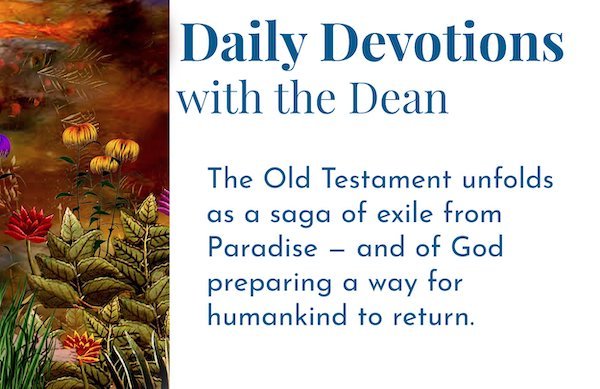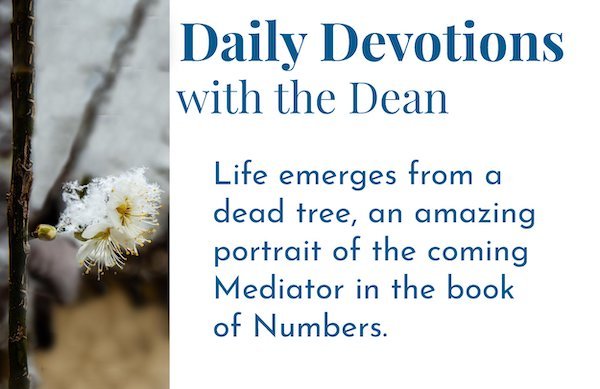Friday • 6/28/2024 •
This morning’s Scriptures are: Psalm 102; Numbers 20:1-13; Romans 5:12-21; Matthew 20:29-34
This morning’s Canticles are: following the OT reading, Canticle 10 (“The Second Song of Isaiah,” Isaiah 55:6–11; BCP, p. 86); following the Epistle reading, Canticle 18 (“A Song to the Lamb,” Revelation 4:11; 5:9–10, 13, BCP, p. 93)
A Flawed Mediator. Because you did not trust in me, to show my holiness before the eyes of the Israelites, therefore you shall not bring this assembly into the land that I have given them. — Numbers 20:12. As sympathetic a figure as Moses is—humblest on the earth, ever interceding for a rebellious people, and friend of Yahweh—he shows himself to be as powerless against sin as the rest of us.
The Lord has simply told Moses to command the rock (and not, by the way, to scold the people) so that the water will flow for the people and their livestock. But Moses works himself up into a fury against the thirsty people. Not content obediently to command the rock, he oversteps and strikes the rock with the staff of God’s authority, and that not once, but twice. In Yahweh’s estimation, this lack of trust places Moses in solidarity with the rest of his generation that had tested Yahweh—those who identified with Nadab and Abihu (Leviticus 10), the gluttons from the first plague (Numbers 11), the ten cowardly spies (Numbers 14), and most recently Korah and company, and the 14,700 who died in the second plague (Numbers 16). Moses will be the last of his generation to perish without entering the Promised Land—though, friend of God that he is, not without a glimpse of it.
It’s a scene with a lot of pathos. It’s a sober reminder to all of us to be vigilant, as the hymn says, to “trust and obey.”
Image: Adaptation, Pixabay
Paradise Regained. As a whole, the Old Testament unfolds as a saga of expulsion from the Garden—of exile from Paradise, a life in perfect communion with God—and of God’s preparing a way for humankind to return. Israel is entrusted with the oracles of God. Her mission is to bear the promise of return, and at the same time, the burden of its cost. We’ve just seen that Moses—the law-giver and one who spoke face to face with Yahweh himself—is susceptible to the curse of disobedience that is common to all humankind.
Carrying forward the storyline of that saga, the epistle to the Romans is animated by an incredible sense of peace, hope, and confidence (for instance, in Romans 5:1-11—yesterday’s reading). The way “back in” has opened up. In today’s reading—some of the densest and most pregnant sentences he is ever to compose—Paul explains the source of such peace, hope and confidence. In Jesus Christ, Israel has ushered onto the stage of world history—and into our personal lives—the One who undoes the tragedy of the Garden.
In brief, here are the points Paul makes in this brilliant paragraph:
The “fall”—along with death that accompanied it—was a natural and just consequence of Adam’s disobedience; but the free gift of eternal life is an extraordinary, countervailing manifestation of “God’s grace” and his “gracious gift in Christ” (v. 15).
It might have been easy for God to intervene to fix things immediately after the fall, but he did it only “after many transgressions” (i.e., after the situation had become arguably unfixable — v. 16). The fall set in motion a sorrowful domino-like series of tragedies (think Shakespeare), that would magnify the loving and merciful character of God in a way that something resolvable by a quick fix would not. Human self-help couldn’t reverse the cumulative effects of “many transgressions.” But God could. And he did.
In sum: One man, Christ, offers “righteous conduct” (dikaioma)—i.e., the obedience of his whole life and of his mounting the cross of Calvary—that leads to the “rightwise-ing/justifying/making right” (dikaiosis) of all. One man, Christ, offers the perfect obedience that undoes the first man’s disobedience.
Thus, while in the present, “sin reigns” because Adam forfeited his/our right to rule, when all is said and done “those who receive…the gift of righteousness will reign” (v. 17) and “grace also will reign” (v. 21).
Result: the entrance of sin into human experience will prove to have brought about God’s greater grace (vv. 20-21). The line from the original “Exsultet” comes to mind: “O truly needful sin of Adam which was blotted out by the death of Christ! O happy fault (felix culpa) which merited so great a Redeemer!”
I pray that our lives may be as animated as are Paul’s words with the sense of peace, hope, and confidence that comes from knowing that, in Christ, grace has taken the field on our behalf. And I pray we all may grip firmly onto the deep understanding that that grace is greater than all the evil, all the confusion, all the sickness we see around—and in—ourselves.
Be blessed this day,
Reggie Kidd+


















